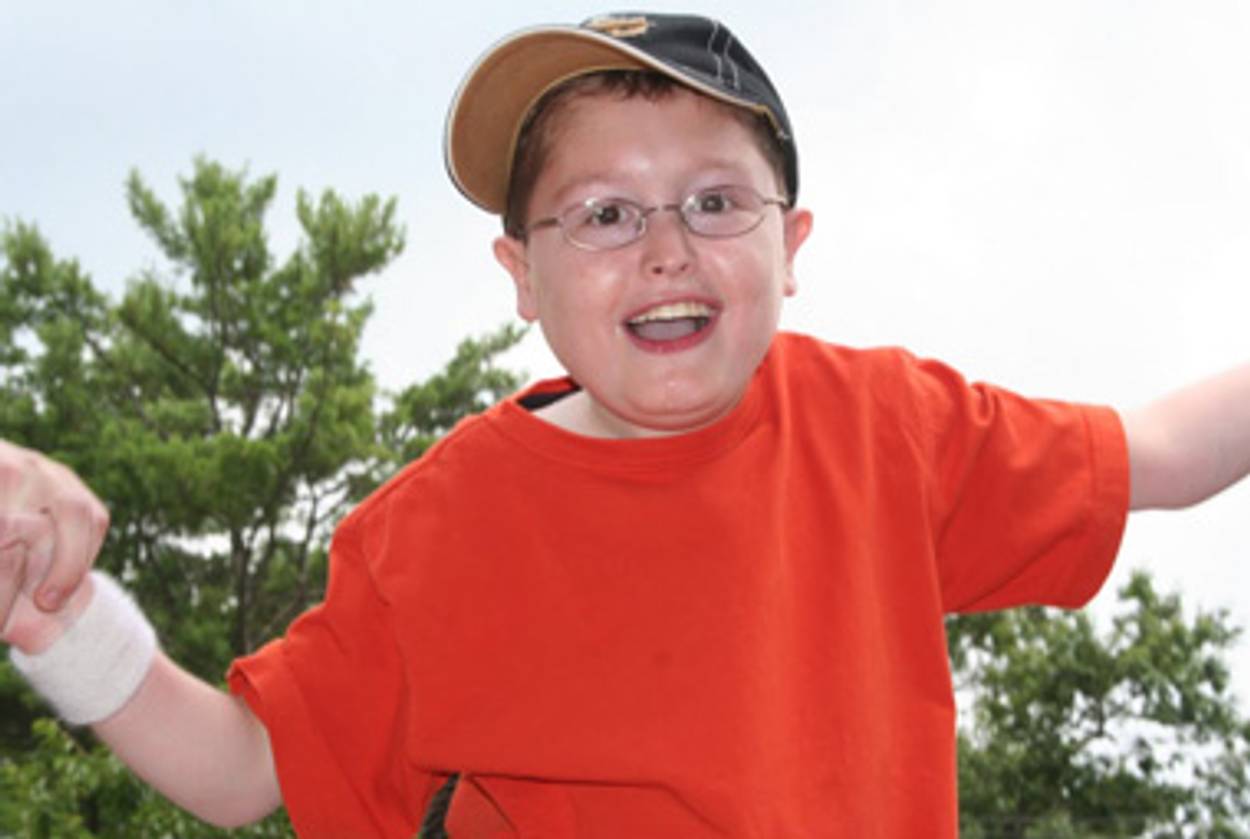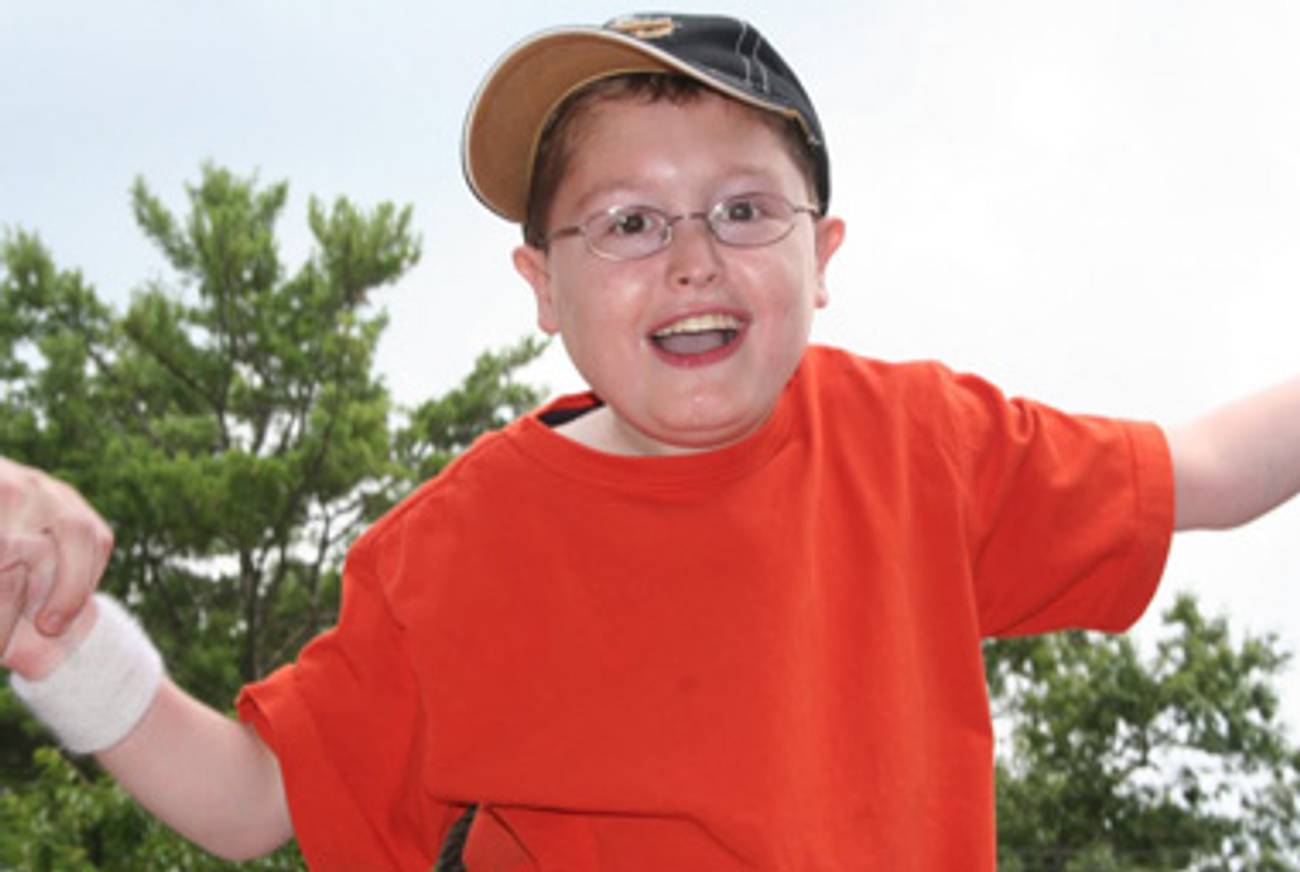Camp for Everyone
The blessings of Jewish camps for special-needs kids




Are you completely sick of me yammering about camp? Well, you’ll be glad to know that this is my last camp-related column of the summer. But while the others have been jokey, this one is anything but.
Meet Ezra, the 12-year-old son of my friend Jeff Kress. Jeff is chair of the Department of Jewish Education at the Jewish Theological Seminary and co-author of the book Building Learning Communities With Character: How to Integrate Academic, Social, and Emotional Learning. Ezra is a cheery, funny kid who has familial dysautonomia, a Jewish genetic disease. It affects his sensory and autonomic nervous systems—which control swallowing, body temperature, pain and heat perception, the regulation of blood pressure, and the ability to produce tears.
When Ezra was 7, Jeff and his wife, Adena, learned about Camp Simcha Special, a camp run by Chai Lifeline for kids with genetic diseases. They signed up Ezra, even though they were concerned. “He was in much less stable medical condition than he is now,” Jeff told me recently. “We were constantly going to the hospital. We couldn’t believe the camp could care for him. We assumed we’d max out the services they could provide. But each child has his own counselor, with whom you meet before camp to go over treatments, and Ezra’s counselor that first year was an Australian guy named Avi with this total can-do attitude—think Crocodile Dundee from yeshiva. Whatever we said about Ezra’s medical needs, he’d say ‘No worries!’ At first we thought it meant ‘I’m not actually listening to you!’ But he was. He was amazing.”
In addition to one-on-one counselors, Camp Simcha Special has a full 24-hour medical staff, an on-site ambulance, and an on-call medevac helicopter. The camp provides a visiting petting zoo, a zip line, and an annual helicopter ride. “I’m the only member of the family who’s been in a helicopter!” Ezra crows to his parents.
In the outside world, Ezra’s speech can be hard to understand, and it’s a challenge for him to make friends. But at camp, his best buddy since day one has been another kid with the exact same symptom profile, the same kind of feeding tube, the same oxygen pump. “Camp is his chance to have his own private jokes and independence,” said Jeff. “It’s his time not to have Mom and Dad hovering all over him all the time. What happens at camp stays at camp.”
And at camp, Ezra has blossomed. “His first summer, he was still easily overwhelmed by noise,” Jeff recalled. “We had to sneak him into camp through the back entrance, because all the people and tumult were too much for him. He couldn’t be in the dining room during meals because all the riotous singing and simcha dancing were too much for him. Now, six years later, we take him right into the main entrance, and he’s immediately surrounded by dozens of guys wearing clown costumes, chanting his name. Now, the kid who couldn’t stay in the dining room gets up on stage in front of the whole camp, with a live band, to do a dance of his own invention, the Ezra Dance, and the whole camp does it with him.”
The camp’s spirit of inclusion, Jeff noted, extends beyond denominational rifts. “Professionally, I look at pluralistic organizations,” he said, “and I am amazed that this one really is nondenominational. The people who run the camp may be more toward the right-wing side of Orthodoxy, but there’s no agenda, just caring for kids. There’s a universalist message—respect your family and be a good person and be nice to guests and thank you, Hashem—that kind of thing. That’s what he’s taking home. The camp is really fueled by ruach-y music and wild, raucous fun.”
Camp lasts two weeks, but it boosts Ezra’s spirits for the entire year. And it’s completely free to families. (In thanks, Jeff does regular fundraising marathons for Chai Lifeline, which pays for everything. You can donate here.) When Ezra has his bar mitzvah, this year, his counselors will there.
Kids like Ezra with intense medical concerns need their own camps. But other special-needs kids do well in mainstream camps. So it’s great that Jewish parents today have a variety of options. Every Ramah camp has some kind of program for kids with disabilities. Camp Yofi at Ramah Darom in Clayton, Ga., includes a family camp for kids with autism and their parents and siblings. There’s also Camp Yaldei, a stand-alone camp in Quebec for kids with developmental delays and neurological disorders; Round Lake Camp, a camp for learning-disabled kids, in the Blue Ridge Mountains near Lake Como, Pa.; Camp Morasha Yachad, for kids with developmental disabilities, in Lakewood, Pa.; Camp HASC, the Hebrew Academy for Special Children’s seven-week camp in the Catskills for mentally and physically handicapped children and adults. And Chai Lifeline runs a second camp in addition to Camp Simcha Special, this one for kids with cancer; it can even deliver on-site chemo.
One of the very first special-needs options was the Tikvah Program at Ramah in New England, which just celebrated its 40th anniversary. Back in 1970, when educators Herb and Barbara Greenberg presented their proposal to accommodate campers with special needs to the National Ramah Commission, most camp directors turned up their noses. They worried that allowing mentally or emotionally disabled kids in camp would be upsetting for the “normal” kids. They fretted that enrollment would suffer. But one director, Donald Adelman of the Ramah in Glen Spey, N.Y., stood up. “He said, ‘This is exactly what Ramah should be. I insist on having it,’” recalled Howard Blas, the program’s current director.
Tikvah took off. Now Ramah in New England, which took over the original program from Glen Spey, offers inclusion bunks (in which special-needs and typical kids live and play together), stand-alone bunks, and a vocational training program for older kids and adults. There are bunks with entrances that can accommodate motorized scooters, barrier-free bathrooms, paved roads that won’t make a wheelchair break an axle. For special-needs kids who aren’t well accommodated in other Jewish settings, camp is an opportunity to live a joyous, immersive Jewish life for a few sweet weeks.
I recently chatted with a 23-year-old camper named Sam Busis, who is on his eighth Tikvah Program summer. “I was scared when I came here at first,” Sam recalled. “But everything is wonderful! I can’t pick a favorite thing. I have friends from all over that I only see when I’m here. I work with little kids. I’ve worked in the guesthouse and the kitchen and I liked that, too. I love swimming in the agam—you can cool off and have fun. But my favorite thing has been the Tikvah Israel trip. I loved Jerusalem. The city was really pretty. I bought a tallis.”
Sam’s mother, Judith Beck, director of the Beck Center for Cognitive Therapy and Research, in suburban Philadelphia, laughed when I told her of Sam’s enthusiasm. “The camp’s been amazing for him,” she said. “We’ve seen him grow in social skills, independence, and a can-do attitude. It’s both nurtured and pushed him a little bit. Going to Israel with Howard was one of the most meaningful experiences of his life. They visited a facility for kids with disabilities, picked vegetables on a kibbutz, visited an archaeological dig—wonderful things that expanded the camp experience. And Sam always liked having a mainstream buddy—they connect kids from the Tikvah program with typical campers. It’s great for the typical campers to see the Tikvah kids as people. There’s a level of acceptance that’s really great.”
I think back to my own Mesozoic experience at Ramah in New England, when immersion and mainstreaming weren’t as common. I remember some boys mercilessly teasing one Amitzim (“brave ones,” the special-needs group) camper. At night, they’d try to goad him into bellowing “Shmira!” (“Guards!”) because with his speech impediment, it came out “Shmiwwa!” The boys found this hysterical. Need I say it wasn’t funny? Need I say I don’t think this would happen today?
Both my daughters—one with special educational needs, one without—will be in immersion classes this year. As I type this, they’re at a JCC Camp in Wisconsin with a special-needs program. As I dropped them off at the bus stop this morning, a boy with Down syndrome, wearing headphones, was singing off-key at the top of his lungs. Josie smiled, “Mikey really likes to sing.”
Ramah doesn’t worry about scaring away parents of nondisabled kids any longer. “Do we tell parents when there will be a Down syndrome kid in a bunk?” asked Blas rhetorically. “Well, would you tell kids in advance that there’s a camper who was adopted from Korea or who has two mothers or that there’s a counselor with 10 piercings? Our community includes lots of people. That’s a good thing for everyone. Accepting differences is great—it helps you accept kids who aren’t pretty, who are overweight, who come from other backgrounds.”
Indeed, the evidence is mounting that living and learning with special-needs kids is good for everyone. Recent research shows that kids without disabilities learn tolerance; kids with disabilities develop greater social skills. Blas pointed me to some as-yet-unpublished research conducted by the National Ramah Commission on 100 fifth- to seventh-grade campers at his camp. Fifty-eight percent agreed or strongly agreed that “experiences with campers from this camp’s special-needs program has made me a better person,” and 63 percent agreed or strongly agreed that “experiences with campers from this camp’s special-needs program will carry over into other areas of my life.”
How Jewish a value is that? Kids like Josie, Sam, and Ezra can all benefit from attending camps serving special-needs kids. Society wins. How much more could anyone ask from summer?
Marjorie Ingall is a columnist for Tablet Magazine, and author of Mamaleh Knows Best: What Jewish Mothers Do to Raise Successful, Creative, Empathetic, Independent Children.
Marjorie Ingall is a former columnist for Tablet, the author of Mamaleh Knows Best, and a frequent contributor to the New York Times Book Review.